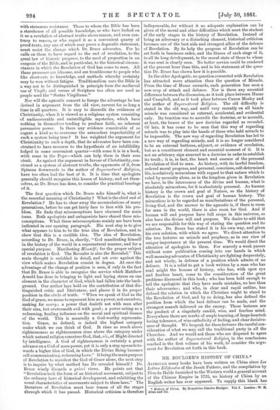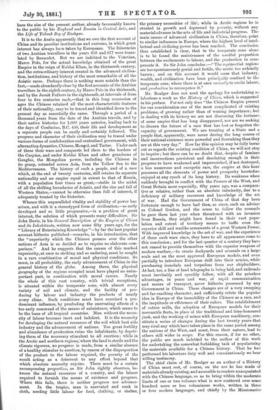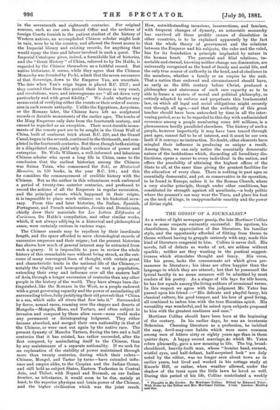MR. BOULGER'S HISTORY OF CHINA.*
ALTHOI:Gil many books have been written on China since Les Letlres Edifiantes of the Jesuit Fathers, and the compilation by Pere du Halde furnished to the Western world a general account of the Chinese Empire in 1735, no history of China by an English writer has ever appeared. To supply this blank has • History of China. By Demetrius Charles Bonlger. Vol. I. London : W. IL Allen and Co.
been the aim of the present author, already favourably known to the public by his England and Russia in Central Asia, and the Life of Yakoob Beg of Kashgar.
It is to the Arabs apparently that we owe the first account of China and its peculiar institutions and customs, in which great interest has always been taken by Europeans. The Itineraries of two Arabian travellers in the years 850 and 877 were trans- lated by Renaudot. But we are indebted to the Venetian, Marco Polo, for the actual knowledge obtained of the great Empire in the reign of ICublai Khan, in the thirteenth century, and the extraordinary interest created in the advanced civilisa- tion, institutions, and history of the most remarkable of all the Asiatic races. Perhaps there is nothing more notable than the fact,—made abundantly clear by the first accounts of the Arabian travellers in the eighth century, by Marco Polo in the thirteenth, and by the Jesuit Fathers in the eighteenth, at intervals of from four to five centuries each,—that in this long succession of ages the Chinese retained all the most characteristic features of their nationality, easy to be traced and identified down to the present day as essentially the same. Through a period of a thousand years from the date of the Arabian travels, and by their native histories for 1,000 years anterior, leading back to the days of Confucius, B.C. 450, their life and development as a separate people can be easily and certainly followed. The progress and character of their civilisation may be traced under various forms of confederation and centralised government, with alternating dynasties, Chinese, Mongol, and Tartar. Under each of these their wars and conquests led them to the borders of the Caspian, and under Kublai Khan and other grandsons of Genghis, the Mongolian power, including the Chinese in its grasp, extended across Asia, from the Yellow Sea to the Mediterranean. The history of such a people, and of a race which, at the end of twenty centuries, still retains its separate nationality and an empire equal in extent to that of Russia, with a population four times as great,—stable in the midst of all the shifting boundaries of Asiatic, and the rise and fall of Western States,—cannot be otherwise than full of interest, if adequately treated by the historian.
Whence this unparalleled vitality and stability of power has arisen, and with it a stereotyped form of civilisation,—so early developed and so little progressive,—is a problem of great interest, the solution of which presents many difficulties. Sir John Davis, in his General Description of the Empire of China and its Inhabitants, written now some fifty years ago, for the "Library of Entertaining Knowledge "—by far the best popular account hitherto published—remarks, in his introduction, that the "superiority which the Chinese possess over the other nations of Asia is so decided as to require no elaborate com- parison." And he suggests that the causes of this marked superiority, at once so striking and so enduring, must be sought in a rare combination of moral and physical conditions. So must, in all probability, the early advancement of China in the general history of the globe. Among these, the physical geography of the regions occupied must have played no unim- portant part, in combination with moral causes. Nearly the whole of this vast country, with trivial exceptions, is situated within the temperate zone, with almost every variety of soil and climate, and the facility of pro- ducing by labour and industry the products of nearly every clime. Such conditions must have exercised a pre- dominant influence, by precluding the enervating effects of a too early command of the means of subsistence, which seems to be the bane of all tropical countries. Man without the neces- sity of labour becomes inert and indolent. It is the necessity for developing the natural resources of the soil which best aids industry and the advancement of nations. Too great fertility and abundance of production ruins the inhabitants, by depriv- ing them of the necessary-stimulant to all exertion ; while in the Arctic and northern regions;where the land is sterile and the climate rigorous, no progress is made, from a similar absence of a healthy stimulus to exertion, by reason of the disproportion of the product to the labour required, the poverty of the result acting as a deterrent to any effort beyond that which absolute necessity enjoins. There must be a certain recompensing proportion, as Sir John rightly observes, be- tween the natural resources of a country, and the labour required to furnish the means of existence and progress. Where this fails, there is neither progress nor advance- ment. In the tropics, man is enervated and stink in sloth, needing little labour for food, clothing, or shelter, the primary necessities of life"; while in Arctic regions he is stunted in growth and depressed by poverty, without any material advance in the arts of life and industrial progress. The main causes of advanced civilisation in China, therefore, point to similar influences in Europe, where the highest level of intel- lectual and civilising power has been reached. The conclusion thus established is clear, that in the temperate zone alone is to be found the maintenance of the needful proportion between the excitements to labour, and the production to com- pensate it. So Sir John concludes :—" The equinoctial regions are too spontaneously genial and fertile, the arctic too unkindly barren ; and on this account it would seem that industry, wealth, and civilisation have been principally confined to the temperate zone, where there is at once necessity to excite labour, and production to recompense it."
Mr. Boulger does not need the apology for undertaking so- laborious a work as the History of China, which is suggested in his preface. For not only does "the Chinese Empire present for our consideration one of the most complicated of existing problems, of growing rather than of waning importance ; but in dealing with its history we are not discussing the fortunes. of some empire that has long disappeared, nor are we seeking to discern the future of a race that has lost or forgotten the capacity of government. We are treating of a State and a people that, apparently, were never during the long course of their national existence more powerful and flourishing than they are at this very day." How far this opinion may be fully borne out as regards the existing condition of China, we will not stop to inquire ; but there can be no doubt that, despite of famines and insurrections persistent and desolating enough in their progress to have weakened and impoverished, if not destroyed,. a less numerous and energetic race, the empire at this hour possesses all the elements of power and prosperity heretofore enjoyed at any epoch of its long history. Its weakness when suddenly brought in conflict with the Powers of the West, and Great Britain more especially, fifty years ago, was a compara- tive or relative, rather than an absolute inferiority, due to a deficiency of military resources and knowledge of the art of war. Had the Government of China of that day been fortunate enough to have had then, as since, such an adviser as Colonel Gordon, and the sense to follow the counsels he gave them last year when threatened with an invasion from Russia, they might have found in their vast popu- lation and extent of territory means to baffle even the superior skill and warlike armaments of a great Western Power. With improved knowledge in the art of war, and the experience of three such wars since, they have to all appearance come to this conclusion ; and for the last quarter of a century they have not ceased to provide themselves with the superior weapons of modern warfare,—to create dockyards and arsenals on a large scale and on the most approved European models, and even partially to introduce European drill into their armies, while purchasing ironclads and torpedoes from our shipbuilders. At last, too, a line of land telegraphs is being laid, and railroads must inevitably and speedily follow, with all the priceless advantages, in peace and war, of rapid communication and means of transport, never hitherto possessed by any Government in China. These changes are of a very sweeping and far-reaching character, and sufficiently refute the popular idea in Europe of the immobility of the Chinese as a race, and the ineptitude or effeteness of their rulers. The establishment of cotton mills, the adoption of European models for their mercantile fleets, in place of the traditional and time-honoured junk, and the working of mines with European machinery, con- stitute a series of changes during the last twenty years that may rival any which have taken place in the same period among the nations of the West, and must, from their nature, lead to others still wider in scope. For this reason, if for no other, the public are much indebted to the author of this work for undertaking the somewhat forbidding task of popularising the materials available for a Chinese history. That he has performed his laborious duty well and conscientiously we bear willing testimony.
The chief claim of Mr. Boulger as an author of a History of China must rest, of course, on the use he has made of materials already existing, and accessible to readers unacquainted with the Chinese language, so as to bring within the moderate limits of one or two volumes what is now scattered over some hundred more or less voluminous works, written in three or four modern languages, and chiefly by the Missionaries in the seventeenth and eighteenth centuries. For original sources, such as our own Record Office and the archives of foreign Courts furnish to the patient student of the history of Western nations, an accomplished Chinese scholar might look in vain, were he in the country, and allowed the freest access to the Imperial library and existing records, for anything that would repay the time and labour involved in such a quest. The Imperial Catalogue gives, indeed, a formidable list of histories, and the "Great History" of China, referred to by Du Halde, is -regarded by the Chinese themselves as a faithful record. But native historians, it seems, while they agree that the Chinese Monarchy was founded by Po-hi, admit that the seven successors of that Sovereign, down to the Emperor Yau, are uncertain. The date when Yau's reign began is placed B.C. 2357; and they contend that from this period their history is very exact, and revolutions, wars, and interregnums are "all set down very particularly and with great fidelity." We doubt whether any means exist of verifying either the events or their order of succes- sion in such remote antiquity. Unlike the Egyptians, Assyrians, or the Romans later, the Chinese have left no sculptured records or durable monuments of the earlier ages. The tombs of the Ming Emperors only date from the fourteenth century, and -cannot be regarded as an exception. Their most durable monu- ments of the remote past are to be sought in the Great Wall of China, built of sunburnt brick about B.C. 220, and the Grand Canal, begun in the seventh, continued in the thirteenth, and com- pleted in the fourteenth centuries. But these, though both existing in a dilapidated state, yield only dumb evidence of power and -enterprise. Dr. Wells Williams, a well-informed and laborious Chinese scholar who spent a long life in China, came to the conclusion that the earliest historian among the Chinese was Szima Tsian, who commenced the Szki, or Historical Memoirs, in 130 books, in the year B.C. 104; and this he cansiders the commencement of credible history with the Chinese. But as the author in this voluminous work embraced a period of twenty-two anterior centuries, and professed to record the actions of all the Emperors in regular succession, and the principal events which happened in their reigns, it is impossible to place much reliance on his historical accu- racy. From this and later histories, the Italian, Spanish, Portuguese, and French missionaries, Jesuits and Dominicans, chiefly drew their materials for Les Lettres Edifiantes et Curieases, Du Halde's compilation, and other similar works, which, if not always edifying in a historical and philosophical sense, were certainly carious in various ways.
The Chinese annals may be repellent by their inordinate length, and the space afforded to mere chronological records of successive emperors and their reigns ; but the present historian has shown how much of general interest may be extracted from such a quarry. It is impossible to pass in review the whole history of this remarkable race without being struck, as the out- come of many convergent lines of thought, with certain great and characteristic traits in the national life of the Chinese,— notably the vitality and homogenity of so vast a population, extending their sway and influence over all the eastern half of Asia, through a longer succession of centuries than any other people in the history of the world. They have always been dis- tinguished, like the Romans in the West, as a people endowed with a great governing capacity and the power of assimilating all surrounding tribes, fully justifying their old proverb that "China is a sea, which salts all rivers that flow into it." Surrounded by fierce, nomad races, roaming over the steppes and deserts of Mongolia—Mongols, Huns, and Tartars, and often subject to invasion and conquest by these alien races—none could make any permanent or disintegrating lodgment. They either became absorbed, and merged their own nationality in that of the Chinese, or were cast out again by the native race. The present dynasty of Manchu Tartars, during the two and a half centuries that it has existed, has rather succeeded, after the first conquest, by assimilating itself to the Chinese, than by any maintenance of a separate nationality. If we seek for an explanation of the stability of power maintained through more than twenty centuries, during which their rulers— Chinese, Mongol, and Tartar by turns—have extended influ- ence and empire alike, to the Caspian and the Indian Ocean, and still hold as subject States, Eastern Turkestan in Central Asia, and Thibet, with Nepaul and Burmah, on our Indian frontier, as tributaries, it would seem to be due, mainly at least, to the superior physique and brain-power of the Chinese, and the higher civilisation which was the joint result.
How, notwithstanding invasions, insurrections, and famines, with frequent changes of dynasty, an autocratic monarchy has survived all these prolific causes of dissolution in other countries, is to be explained apparently by the fact that the whole theory of government and the relations between the Emperor and his subjects, the ruler and the ruled, has for its foundation a principle implanted by nature in the human heart. The parental and filial relations, im- mutable and eternal, knowing neither change nor diminution, are universally recognised as the bond of family and social life, and the only true source of authority in the head, and of obedience in the members, whether a family or an empire be the unit. That a nation thus endowed and circumstanced should have, as early as the fifth century before Christ, produced a philosopher and statesman of such rare capacity as to be able to frame a system of moral and political philosophy, so entirely adapted to enforce and perpetuate this fundamental law, on which all legal and social obligations might securely rest through all ages,—and that the authority of this great teacher should have been untouched by time in all the inter- vening period, so as to be regarded to this day with undiminished reverence among a people numbering some 400 millions, is a phenomenon hardly paralleled elsewhere. The history of such a people, however imperfectly it may have been traced through past ages, cannot fail to be of interest, and it must be our own fault if it conveys no instruction. No doubt, other elements have mingled their influence in producing so unique a result.• Among these, we can only notice the essentially democratic nature of the institutions which, discarding all hereditary dis- tinctions, opens a career to every individual in the nation, and offers the possibility of attaining the highest offices of the State to all, at the same time giving the greatest facilities for the education of every class. There is nothing in past ages so essentially democratic, and yet so conservative in its operation, to be found in Europe, unless it be the Roman Church, where a very similar principle, though under other conditions, has constituted its strength against all assailants,—a body politic where the peasant's son may wear the Tiara, and place his foot on the neck of kings, in unapproachable sanctity and the power of divine right.




































 Previous page
Previous page